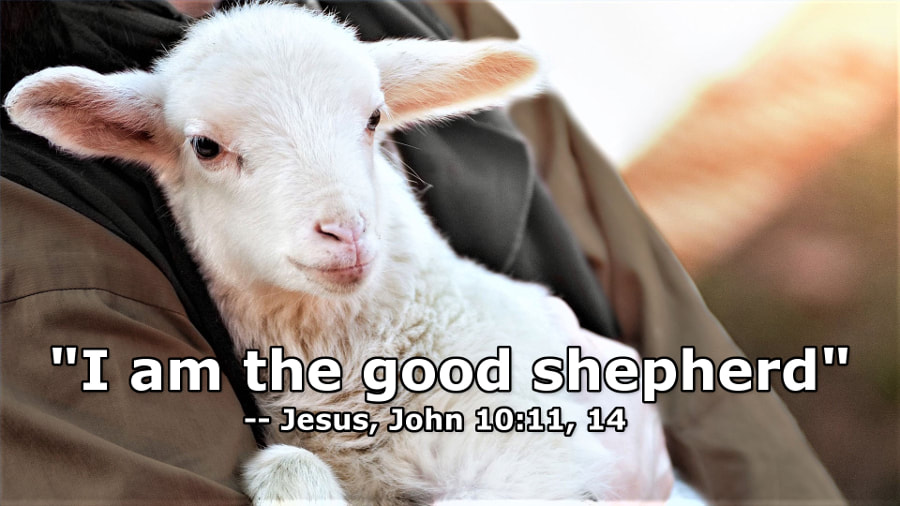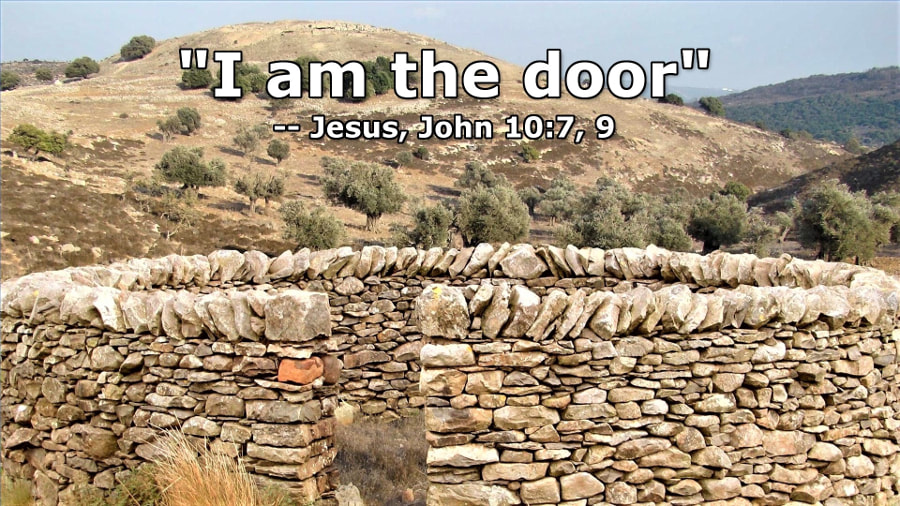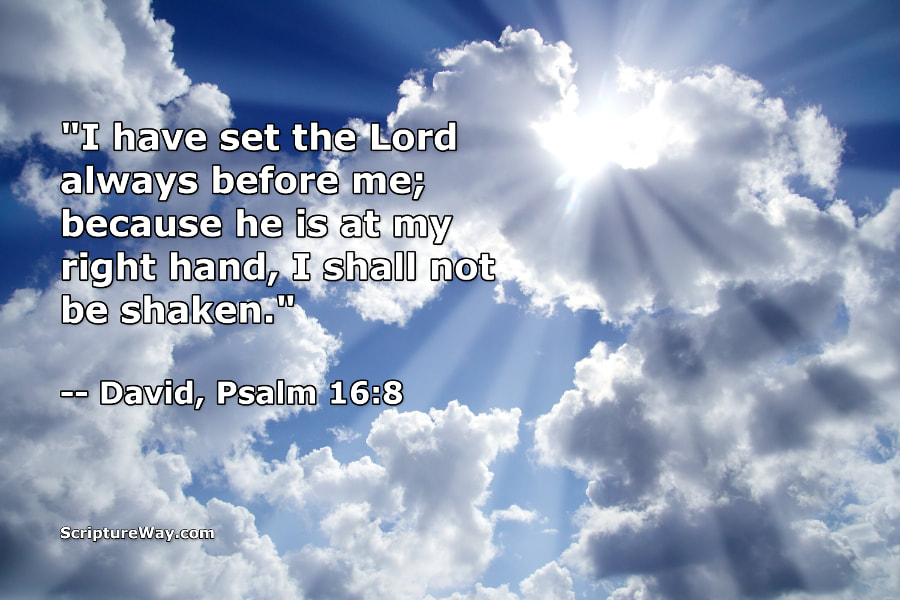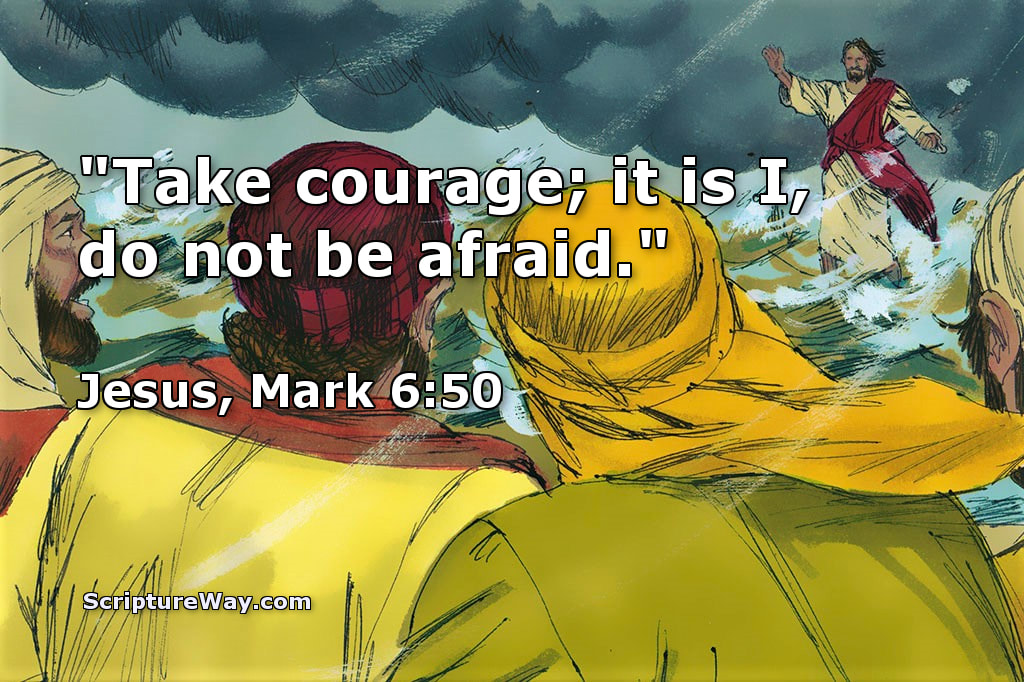"I have set the Lord always before me; because he is at my right hand, I shall not be shaken." (Psalm 16:8 ESV)
"David said about him: 'I saw the Lord always before me. Because he is at my right hand, I will not be shaken.'" (Acts 2:25 NIV)
This lesson examines the meaning of the three phrases in Psalm 16:8 -- "I have set the Lord always before me," "Because he is at my right hand," and "I shall not be shaken."
Consider. Do you feel that God is always near you?
When David said, "I have set the Lord always before me," what did he mean?
When David said "I have set the Lord always before me," he felt that he was always in the presence of God -- that God was present with him, always near him, and always before his face (Psalm 16:8, Ref. 1, Ref. 2, Ref.3). David felt God's presence continually -- night and day, in public professions and in private meditations (Ref. 1). God was with him alike in happiness and in trouble (Ref. 4).
The apostle Peter quoted Psalm 16:8 during his Pentecost sermon (Acts 2:14-36). The first sentence of Acts 2:25 states, "David said about him: 'I saw the Lord always before me.'" The Greek word for saw in Acts 2:25 means to keep before one's eyes, metaphorically, to be mindful of one always (Ref. 5 Thayer's Greek Lexicon). When we see the Lord always before us, he is our focus, and he is preeminent in our thoughts, words, and deeds -- always. When Peter quoted Psalm 16:8 in Acts 2:25, Peter was clear that "the Lord" he was referring to was Jesus of Nazareth who God raised from the dead (Acts 2:22-25). "Because He Is At My Right Hand" Meaning
"At the right hand" is a place of protection and defense. "For he [the Lord] stands at the right hand of the needy one, to save him from those who condemn his soul to death" (Psalm 109:31, brackets added). "The Lord is your keeper; the Lord is your shade on your right hand" (Psalm 121:5).
Think of the image of a warrior standing at your right side, who in the conflict of battle extends his shield over his comrade on the left hand (you) to guard him (you) from attack (Ref. 6). The Lord's shield is big enough to protect you. David wrote, "But you, O Lord, are a shield about me, my glory, and the lifter of my head" (Psalm 3:3). Throughout the Bible, "at the right hand" also means the place of honor (Psalm 110:1, Mark 16:19). "I Shall Not be Shaken" Meaning ("I Will Not be Shaken" Meaning)
David said, "Because he [the Lord] is at my right hand, I shall not be shaken" (Psalm 16:8 ESV, brackets added). The King James Version translates this last phrase of Psalm 16:8 as "I shall not be moved." The New American Standard Bible translates this phrase as "I will not be shaken" (Psalm 16:8 NASB).
The Hebrew word for shaken or moved in Psalm 16:8 is mot (phonetically pronounced as mote). Mot means to totter, shake, or slip (Ref. 7). In Acts 2:25 (Peter's quotation of Psalm 16:8), the Greek word for shaken is saleuó. Saleuó means to agitate, shake, disturb, or to cast down from one's (secure and happy) state (Ref. 8). David felt the Lord's presence with him continually. Because the Lord was at his right hand, the Lord was close, ready to protect and save. Therefore, David was not shaken or moved (Ref. 4). For David, because the Lord was at his right hand, nothing could cast him down from his trust and confidence in the Lord. Summary - the Main Principles in this Lesson
As believers in Christ:
1. We should set the Lord always before us -- before our eyes, always preeminent in our thoughts, words, and deeds. 2. The Lord is at our right hand always to protect us and defend us. His shield is big enough to protect us. 3. Because the Lord is at our right hand, we will not totter, slip, be disturbed, or become cast down. In the Lord we trust, and in him we are confident and secure.
Apply. Lord Jesus, show me ways that I can better know your presence with me today and every day. Thank you for being at my right hand to protect me and help me. Thank you that in you I am secure.
References
1. https://biblehub.com/commentaries/barnes/psalms/16.htm 2. https://biblehub.com/commentaries/barnes/acts/2.htm 3. https://biblehub.com/commentaries/cambridge/psalms/16.htm 4. https://biblehub.com/commentaries/pulpit/psalms/16.htm 5. https://biblehub.com/greek/4308.htm 6. https://biblehub.com/commentaries/ellicott/acts/2.htm 7. https://biblehub.com/hebrew/4131.htm 8. https://biblehub.com/greek/4531.htm
2 Comments
"They all saw Him and were terrified. But immediately He spoke with them and said to them, 'Take courage; it is I, do not be afraid.'" (Mark 6:50) This article is the second in a series on the "'Fear Nots' of the Bible." The first article presented the "'Fear Nots' of the Old Testament" (Ref. 1). In the Old Testament, God assured the Israelites, "Fear not, for I am with you" (Isaiah 41:10). Moses encouraged the Israelites about the Lord's presence with them, "Do not be afraid or tremble at them, for the Lord your God is the one who goes with you. He will not fail you or forsake you" (Deuteronomy 31:6). This article presents statements of Jesus where he tells us to "Fear not" or "Do not be afraid." Jesus Christ, the Son of God, assures those who believe in him and follow him that we have no reason to fear. Consider. In what areas of your life are you afraid? With what circumstances or trials would you like Jesus to give you courage and peace? Definition of Fear Unless indicated otherwise, the verses in this article use the Greek word phobeó for fear or afraid (Ref. 2). The New Testament uses phobeó to mean put to flight (withdraw from), terrify, frighten, dread, or reverence (Ref. 2). Jesus Gives Us Courage in the Midst of Our Trials Recall the event when Jesus walked on the water of Lake Galilee late at night to come to his disciples who were struggling with rowing against the wind (read here, Mark 6:45-52). In Mark 6:48 the Greek language uses a serious word to describe the disciple's situation. The New American Standard Bible says the disciples were straining at the oars for the wind was against them. The Greek word for straining is basanizó, which means a tormenting trial, to examine by using torture (Ref. 3). Wow. Jesus took the initiative and came to his disciples during their tormenting trial at sea (Mark 6:48). The disciples saw Jesus approaching, but did not recognize him at first. They thought he was a ghost, and they were frightened (Mark 6:49-50). Jesus said to them, and he says to us in our trial, "Take courage; it is I, do not be afraid" (Mark 6:50). The Greek word for courage is tharseó, which means emboldened from within (Ref. 4). For the believer, bold courage is infused by the Lord and means "living out the inner confidence (inner bolstering) that is Spirit-produced" (Ref. 4). By faith, Jesus gives us courage (inner boldness and confidence) during our trials. His presence with us calms our storms (Mark 6:51, Mark 4:38-39). Believing in Jesus is the Remedy for Our Fear A synagogue official named Jairus came to Jesus and urgently asked Jesus, "My little daughter is at the point of death; please come and lay Your hands on her, so that she will get well and live" (Mark 5:22-23). While on the way, bad news came from the house of the synagogue official. "Your daughter has died; why trouble the Teacher anymore?" (Mark 5:35). Jesus disagreed with the advice of the bad news bearer to not trust further in Jesus. Jesus immediately said to Jairus, "Fear not, only believe" (Mark 5:36). In the face of bad news, believing in (trusting in, having faith in) Jesus is the only remedy for our grief and fear (Ref. 5, Ref. 6). Jesus knew that he "had things under control." Jairus only needed to believe. Jesus went on to raise Jairus' daughter from the dead (Mark 5:40-42). God Knows Us, Values Us, and Cares for Us Jesus said, "Are not two sparrows sold for a copper coin? And not one of them falls to the ground apart from your Father’s will. But the very hairs of your head are all numbered. Do not fear therefore; you are of more value than many sparrows" (Matthew 10:29-31). English Theologian John Gill (1697 - 1771) wrote, "If God takes care of sparrows and is concerned for their lives, much more will he take care of his faithful ministers, and not suffer their lives to be taken away, till they have done the will and work of their Lord" (Ref. 7, Ref. 8). Jesus Gives Give Us Peace that the World Cannot Give On the evening before his death, Jesus said to his disciples, "Peace I leave with you; My peace I give to you; not as the world gives do I give to you. Do not let your heart be troubled, nor let it be fearful" (John 14:27). Jesus gives his disciples peace. The peace that Jesus gives dispels our fear. The Greek word for peace in John 14:27 is eiréné. Eiréné (peace) is God's gift of wholeness including peace of mind (Ref. 9). The invocation of peace (shalom in Hebrew) also was a common Jewish farewell, in the Hebraistic sense of the health (welfare), security, safety, and prosperity of an individual (Ref. 10, 1 Samuel 1:16-18, 1 Samuel 20:42). The Greek word for fear in John 14:27 is deiliaó, which means to be cowardly (Ref. 11). Deiliaó is used only this one time in the New Testament. Jesus' presence and his words bring comfort, courage, and peace to his disciples then and now. Apply. If you do not yet know Jesus, put your faith and trust in him. Believing in Jesus is the only remedy for your fear. If you do know Jesus, and you are going through a difficult time, pray, and put your trust in Jesus. He will provide you the comfort, courage, and peace that you seek. References
1. http://www.ScriptureWay.com/home/fear-nots-of-the-old-testament 2. https://biblehub.com/greek/5399.htm 3. https://biblehub.com/greek/928.htm 4. https://biblehub.com/greek/2293.htm 5. https://biblehub.com/greek/4100.htm 6. https://biblehub.com/commentaries/mhc/mark/5.htm 7. https://biblehub.com/commentaries/gill/matthew/10.htm 8. https://en.wikipedia.org/wiki/John_Gill_(theologian) 9. https://biblehub.com/greek/1515.htm 10. https://biblehub.com/hebrew/7965.htm 11. https://biblehub.com/greek/1168.htm
Photo source: FreeBibleImages.org

The Good Shepherd. Photo Copyright David Padfield. Used under license. Jesus said, “I am the good shepherd” (John 10:11, 14). Jesus told a parable about a good shepherd who went searching for one of his sheep that was lost (Luke 15:1-7). Jesus said, “For the Son of Man has come to seek and to save that which was lost” (Luke 19:10).
"Our Lord not only declares that He is the reality of which the earthly shepherd is the shadow, and that He as the flawless, perfect One, but that He alone is the reality. 'I am the Good Shepherd; in Me and in Me alone is that which men need.' " -- Alexander MacLaren (1826-1910) (Ref. 1, Ref. 2)
This lesson is the fourth in a series on the "I AM" statements of Christ. This lesson discusses Jesus' statements, "I am the good shepherd," in John 10:11 and John 10:14.
Consider. Are you like a lost sheep? Have you gone astray (Isaiah 53:6)? Are you living outside of the sheepfold? Jesus Christ is the Good Shepherd, the one who loves us, seeks us, saves us, and protects us. He is the one who laid down his life for his sheep. He is the one who knows us.
God is Our Shepherd (Old Testament Perspective)
The Old Testament describes God as the shepherd for his people. God is the one who cares for the total well-being of his sheep. David wrote, "The Lord is my shepherd, I shall not want. He makes me lie down in green pastures; He leads me beside quiet waters. He restores my soul; He guides me in the paths of righteousness For His name’s sake" (Psalm 23:1-3).
In a perhaps less widely-known passage, Ezekiel also described the characteristics of the Lord God as the shepherd of Israel (Ezekiel 34:11-16):
Hundreds of years before Jesus came, Isaiah spoke of Jesus. "He shall feed his flock like a shepherd: he shall gather the lambs with his arm, and carry them in his bosom, and shall gently lead those that are with young" (Isaiah 40:11). "I Am the Good Shepherd"
The Greek word for good means beautiful, as an outward sign of inward good, noble, honorable character (Ref. 3). Think of the greatness and the immensity of the claim that Jesus makes upon our faith in John 10:11 and John 10:14. Jesus claims to be the divine shepherd witnessed to and described by the psalmist and the prophets.
Jesus states that in him alone is everything that we need - sustenance, protection, care, restoration, direction, and eternal life (Luke 15:4, Luke 19:10, Psalm 23:1-3, John 10:3-4, John 10:9, John 10:27-28, Ref. 1). The Greek text in John 10:11 and John 10:14 uses the definite article "the" before "good shepherd" (Ref. 4, Ref. 5). "The definite article claims this ['I am the good shepherd'] as a description applicable to Himself alone" (Expositor's Greek Testament - Ref. 6, brackets added). "The Good Shepherd Lays Down His Life for the Sheep"
Jesus states two features by which he as the good shepherd would be known. The first feature is his giving his life for the sheep (John 10:11, Ref. 6). Recall the personal risk of life that David faced because he was a shepherd. David himself rescued the lamb of his father's flock from the mouth of the lion and the bear (1 Samuel 17:34-36, Ref. 7). "That self-sacrifice that would lead the shepherd to risk his own life for that of the flock has its ideal fulfillment in Him who is the Good Shepherd, and will give His life for mankind" (Ref. 7).
"The death of the Shepherd is the security of the sheep; and I say to you, the flock, that for every soul the entrance into the flock of God is through the door of the dying Christ, who laid down His life for the sheep, and makes them His sheep who trust in Him" (Ref. 1, Ref. 8). "I Know My Own and My Own Know Me"
Jesus stated a second feature by which he would be known as the good shepherd. That feature is the reciprocal knowledge of the sheep and the shepherd (John 10:14, Ref. 6). The Greek word for know in John 10:14 is ginóskó, which means to know, especially through personal experience (Ref. 9). However, the language for know in John 10:14 describes more than a dictionary lookup alone conveys. Jesus describes closest communion between himself as the good shepherd and his sheep (Ref. 7). Jesus describes the relationship as loving regard, affection, and recognition between the shepherd and his sheep (Ref. 1). He knows us because he loves us. As his sheep, we know him as our shepherd, and we love him and trust him. We know his voice and we follow him (John 10:4, John 10:27-28).
Apply. Jesus loves you and already knows you. Jesus wants to have a close reciprocal relationship with you. Are you loving him, trusting him, and following him today?
References
1. https://biblehub.com/commentaries/maclaren/john/10.htm 2. https://en.wikipedia.org/wiki/Alexander_Maclaren 3. https://biblehub.com/greek/2570.htm 4. https://biblehub.com/interlinear/john/10-11.htm 5. https://biblehub.com/greek/3588.htm 6. https://biblehub.com/commentaries/egt/john/10.htm 7. https://biblehub.com/commentaries/ellicott/john/10.htm 8. http://www.ScriptureWay.com/home/jesus-is-the-door 9. https://biblehub.com/greek/1097.htm
Photo source: FreeBibleImages.org

Permanent Sheepfold Enclosure - Holy Land. Photo Copyright David Padfield. Used under license. Permanent sheepfolds were built on the sunny side of valleys where there is protection from cold winds. These had stone walls, 4-5ft high and one entrance guarded by the shepherd. Thorns were often put on the top of walls to deter wild animals. Jesus referred to such a sheepfold and to thieves and robbers climbing over the wall (John 10:1-3).
"So Jesus said to them again, 'Truly, truly, I say to you, I am the door of the sheep.' " (John 10:7, Ref. 1)
"I am the door; if anyone enters through Me, he will be saved, and will go in and out and find pasture." (John 10:9)
"Christ is the Door. And what greater security has the church of God than that the Lord Jesus is between it and all its enemies? ... Here are plain directions how to come into the fold; we must come in by Jesus Christ as the Door." -- Matthew Henry (Ref. 2)
This lesson is the third in a series on the "I AM" statements of Christ. This lesson discusses Jesus' "I am the door" statements in John 10:7 and John 10:9.
Consider. Have you entered into the church of God by believing in the Lord Jesus Christ? Are you experiencing spiritual nourishment in Christ? "If anyone enters through Me" - John 10:9
We enter the sheepfold, the church of God, through Jesus Christ (and only through Jesus Christ). Jesus said, "Truly, truly, I say to you, I am the door of the sheep" (John 10:7). We enter that door when we place our faith and trust in Jesus Christ. "As the only proper way of entering the fold was by the door, so the only way of entering the church of God is by believing on him and obeying his commandments" (Ref. 3).
Jesus said, "I am the way, and the truth, and the life; no one comes to the Father but through Me" (John 14:6). "He will be saved"
Once we have entered the door by faith and trust in Jesus Christ, we are saved. Jesus delivers us from perils such as ravenous wolves and false shepherds (Ref. 4, John 10:1-2). Jesus frees us from the power, guilt, and penalty of sin (Romans 8:1-2, Ephesians 2:1-9). Jesus gives us eternal security. Jesus said, "My sheep hear My voice, and I know them, and they follow Me; and I give eternal life to them, and they will never perish; and no one will snatch them out of My hand" (John 10:27-28).
HELPS Word-Studies defines saved as rescued from destruction and brought into divine safety (Ref. 5). "And will go in and out and find pasture"
To go "in and out" is the common Old Testament expression to denote free activity of daily life (Ref. 6). When Moses charged the Israelites at Mount Gerizim to obey the Lord, he said, "Blessed shall you be when you come in, and blessed shall you be when you go out" (Deuteronomy 28:6, Deuteronomy 27:11-12, Deuteronomy 28:1-2). David wrote about the Lord, the Keeper of Israel (Psalm 121:5). David said, "The Lord will guard your going out and your coming in from this time forth and forever" (Psalm 121:8).
Through Jesus (because he is the door), we have security for our daily needs and nourishment for our souls. Under the care of Jesus, we find pasture - food for our souls (Ref. 7). David wrote, "The Lord is my shepherd; I shall not want. He maketh me to lie down in green pastures: he leadeth me beside the still waters" (Psalm 23:1-2 KJV).
Apply. Have you entered the sheepfold of Christ by believing in him? If not, then put your faith and trust in him today. Are you spending time with Jesus daily to receive spiritual nourishment? How can you improve in this area?
References
1. http://www.ScriptureWay.com/home/when-jesus-said-truly-truly-what-did-he-mean 2. https://biblehub.com/commentaries/mhc/john/10.htm 3. https://biblehub.com/commentaries/barnes/john/10.htm 4. https://biblehub.com/commentaries/pulpit/john/10.htm 5. https://biblehub.com/greek/4982.htm 6. https://biblehub.com/commentaries/egt/john/10.htm 7. https://biblehub.com/commentaries/benson/john/10.htm |
Daily Bible Verse(Click the link above) AuthorMr. Whitney V. Myers. Christian. For more information, please visit the Author Page. Posting ScheduleI plan to provide new postings about once a month. Planned Topics(subject to change) Recent Posts(most recent three months) Popular Posts(top 10) Categories
All
Archives
July 2024
|
|
Copyright 2018-2024 Whitney V. Myers |
Listed in Feedspot's Top 100 Bible Study Blogs and Websites |


 RSS Feed
RSS Feed
